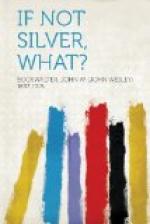“The natural result of this method of enhancing the value of commodities other than gold is that when prices rise or fall the impression is conveyed to a superficial observer that it is the value of other things that changes, the value of the sovereign remaining fixed.”
Under this head he says again:
“The price of things estimated in gold—their gold price—may change, whilst their price estimated in silver—their silver price—remains unaltered. This will occur if the value or purchasing power of gold goes up or down, while the value or purchasing power of silver remains unaltered. Suppose, for instance, that gold is in any way scarce in relation to the demands upon it. Then, in any country where gold is the standard metal of the currency, those who wish to obtain, a certain quantity of gold, whether in coin or in bullion, will have to give a larger quantity of other commodities in exchange for it; or, to put the matter in another light, those who have only a definite commodity to part with will receive less gold in return for that; in other words, there is a fall in gold prices. Suppose, on the contrary, that gold is abundant in relation to the demands upon it, then those who wish to obtain a certain quantity of gold, whether in currency or in bullion, will not have to give so large a quantity of other commodities to obtain the quantity of gold they require; or, to put the matter as before in another light, those who have a definite quantity of other commodities to dispose of will obtain more gold in return for them; in other words, there is a rise in gold prices. If in either case there is no change in the value of silver, then the price of commodities stated in silver, that is, their silver price, will remain unchanged.”
In referring to the very prevalent notion, especially among the uneducated classes, that the gold unit of measure of value does not vary, he says:
“As for the tenant purchaser, he probably thinks that after the extra pressure of the first few years he may look forward to easy times for the rest of his life. He little knows what is before him. If things go on as they are, it will be harder for him, ten or fifteen years hence, to pay forty pounds a year than it would be to pay fifty pounds a year now; but of all this he knows nothing—how could he? His only idea is that a pound is always a pound, and a sovereign is always a sovereign; so, in the belief that the yearly payment, when it is reduced to forty pounds, will be well within his reach, he puts his head into the halter.”
THE “DUMP” OF SILVER.
All the world will dump its silver on us if we adopt free coinage, says the monometallist. How much, and where will it come from? asks the bimetallist. Oh, the world has billions of it ready for us, is the vague general reply; but when we ask for a bill of particulars we get instead a fine confusion of prophecy.




